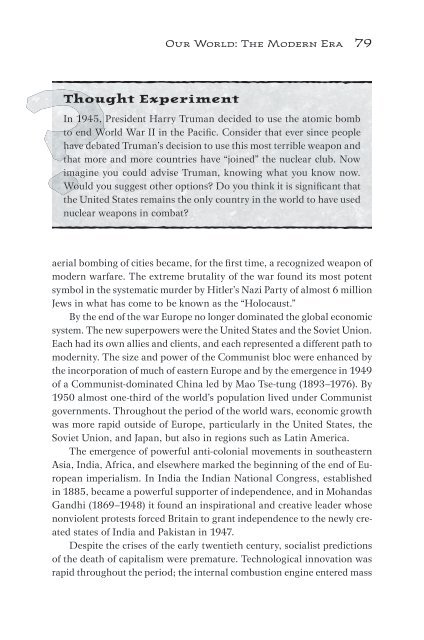This Fleeting World
This Fleeting World
This Fleeting World
You also want an ePaper? Increase the reach of your titles
YUMPU automatically turns print PDFs into web optimized ePapers that Google loves.
Our <strong>World</strong>: The Modern Era 79<br />
Thought Experiment<br />
In 1945, President Harry Truman decided to use the atomic bomb<br />
to end <strong>World</strong> War II in the Pacific. Consider that ever since people<br />
have debated Truman’s decision to use this most terrible weapon and<br />
that more and more countries have “joined” the nuclear club. Now<br />
imagine you could advise Truman, knowing what you know now.<br />
Would you suggest other options? Do you think it is significant that<br />
the United States remains the only country in the world to have used<br />
nuclear weapons in combat?<br />
aerial bombing of cities became, for the first time, a recognized weapon of<br />
modern warfare. The extreme brutality of the war found its most potent<br />
symbol in the systematic murder by Hitler’s Nazi Party of almost 6 million<br />
Jews in what has come to be known as the “Holocaust.”<br />
By the end of the war Europe no longer dominated the global economic<br />
system. The new superpowers were the United States and the Soviet Union.<br />
Each had its own allies and clients, and each represented a different path to<br />
modernity. The size and power of the Communist bloc were enhanced by<br />
the incorporation of much of eastern Europe and by the emergence in 1949<br />
of a Communist-dominated China led by Mao Tse-tung (1893–1976). By<br />
1950 almost one-third of the world’s population lived under Communist<br />
governments. Throughout the period of the world wars, economic growth<br />
was more rapid outside of Europe, particularly in the United States, the<br />
Soviet Union, and Japan, but also in regions such as Latin America.<br />
The emergence of powerful anti-colonial movements in southeastern<br />
Asia, India, Africa, and elsewhere marked the beginning of the end of European<br />
imperialism. In India the Indian National Congress, established<br />
in 1885, became a powerful supporter of independence, and in Mohandas<br />
Gandhi (1869–1948) it found an inspirational and creative leader whose<br />
nonviolent protests forced Britain to grant independence to the newly created<br />
states of India and Pakistan in 1947.<br />
Despite the crises of the early twentieth century, socialist predictions<br />
of the death of capitalism were premature. Technological innovation was<br />
rapid throughout the period; the internal combustion engine entered mass


